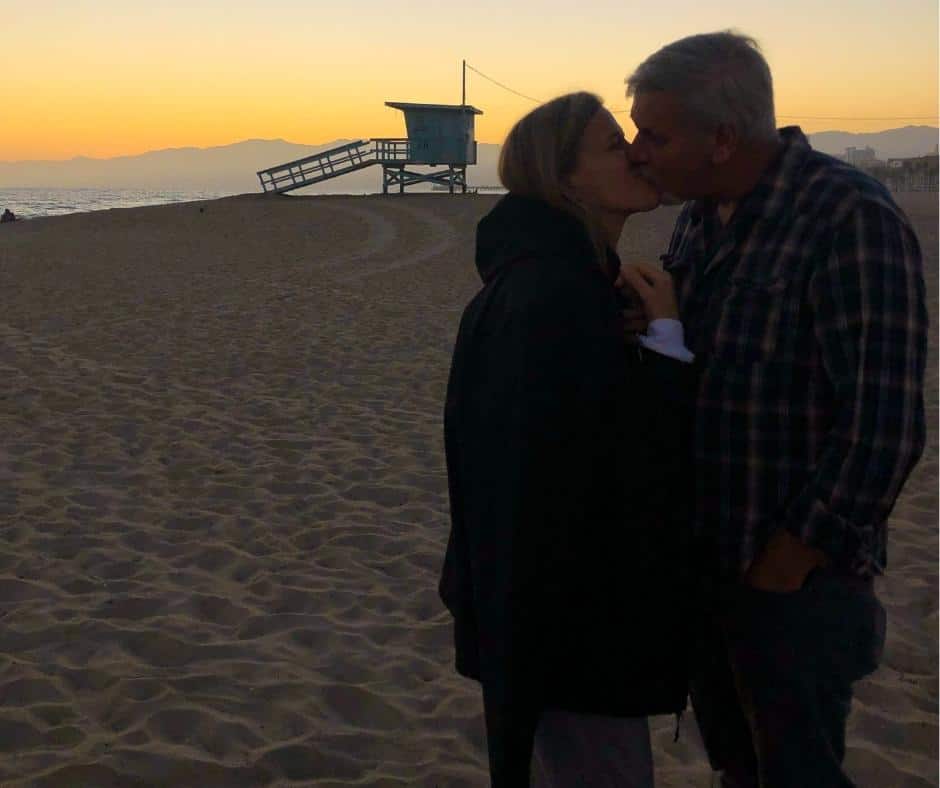5 Successful Relationship Strategies When Living With Chronic Disease
When my guy was initially diagnosed with Parkinson’s disease his symptoms were so mild that it was easy to forget, and it barely affected our lifestyle or relationship. But as things progressed, we slowly needed to make adjustments, including learning new relationship strategies. Here are 5 successful relationship strategies that has made all the difference.

These 5 successful relationship strategies have been key to helping Doug and I navigate the constant adjustments of living with chronic disease. When my guy was diagnosed with Parkinson’s disease, we had been together for about 6 years.
Parkinson’s disease is a slow progressive disease. So when Doug was initially diagnosed, first, I wasn’t surprised because I saw the symptoms years before his diagnosis actually, but it also didn’t initially change much in our relationship.
At the time Doug’s symptoms were mild, a slight tremor on one side of his body. So it didn’t affect much in our day to day living, and therefore it was easy to ignore.
Living With Chronic Disease
But now as the years have gone by, and Doug’s PD is progressing, we find ourselves continually having to adjust, in all aspects of our life and relationship. This part of living with a chronic disease is not easy. Not just for the one experiencing the disease but also for their care partner and the loved ones around them.
Intellectually I know nothing is constant but change itself. I often told my children when they were growing up that being flexible and willing to adapt would help them very much in life. Little did I realize just how much I too would have to use this tool.
Benefits Of Adapting
When it comes to adapting, research shows a positive relation between adaptability and life satisfaction. The better we are able to be flexible and adapt, the more we can adjust our psychological resources for new and ever changing conditions.
Being a care partner for your spouse is different from other kinds of caregiving, and there can be a lot of mixed emotions that come with it. Finding successful relationship strategies to help you as a couple manage the ever changing climate helps tremendously,
Being a care partner for your spouse is different from other kinds of caregiving, and there can be a lot of mixed emotions that come with it.
In a relationship, oftentimes people will come into it with a specific role to play. Husband, wife, provider, nurturer, domestic, professional etc. Over time these rolls can become cemented in stone.
I know women whose husbands provide for them, and they have little knowledge of their bills and investments. I also know men whose wives do the majority of the cooking and cleaning and, should their wife gets sick, it would be a steep learning curve to take on these domestic responsibilities.
Of course there are many more roles than these in a relationship, and I am not judging by any means. Each relationship has its own structure. I am merely pointing out how roles in a relationship can become ingrained and, as time moves on, it can become increasingly more difficult to move out of our comfort zone.
Flexibility – Successful Relationship Strategies
Living with Parkinson’s disease means Doug and I have to learn to be continually fluid and flexible. Not an easy feat. Just when we think we are getting the hang of a new schedule or new roles for ourselves, we inevitably have to adjust again…and again.
And this sometimes can be extremely hard to do. Yes, I get frustrated, and angry, and sad but so does my guy. It’s a constant adjustment. But because we have to have this flexibility, I also feel like I am so much better equipped to adapt and adjust in other areas of my life. Like with friends, my children, and my job.

5 Successful Relationship Strategies
I talked to Doug about this weeks blog post topic, and together we wanted to share with you our top 5 successful relationship strategies. And how, we feel, a relationship must evolve when living with chronic disease.
1. Sense Of Humor
Having a sense of humor will help you in all aspects of your life but definitely when you are living with Parkinson’s or any other chronic disease.
Life can be crazy, stressful, and if you can’t find the humor in things I think it would be very easy to fall into a depression.
I think Doug and I both have a pretty good sense of humor. Thankfully somehow it works out that when I’m not seeing the bright side, Doug’s humor is on, and then when he’s feeling down mine kicks in.
It’s important to be open and honest, and laugh at your faults and personality. Doug oftentimes makes fun of my type A personality but deep down I know he loves and appreciates it.
I in turn tease Doug but he also knows the things I tease him about are the things I like about him as well.
Opposites attract and you can’t let that pull you apart over time.
2. Pride Must Take A Backseat
I’ll be honest, Doug and I both are prideful people. Too much. We both can be prideful and stubborn as mules.
On the positive side, Parkinson’s has shown us that people need each other, and that is okay. Doug has had to set aside his pride and ask for help. It’s not easy I can tell, and I try to show him it’s always okay to ask me for help.
I know this is probably one of the more sensitive things when it comes to a progressive chronic disease. Knowing you will more than likely need increasingly more and more help as the days, months, and years go on.
A Two Way Street
I think it’s extremely important, as a care partner, to assure and affirm your loved one that it is okay. Let them know you understand, and that you are up for the job.
Yet it is also important for us as care partners to be open and honest with ourselves, our family, and our loved ones. If you need a break, you need a break! It’s okay to need help also.

There are times when I tell Doug that I need a break. I need just a few minutes to gather my thoughts, and rest my body.
One of the most important and special times for me is first thing in the morning when I wake up. I have a mental health morning routine that I do every morning before starting my day. I did an in depth blog post about that, you can find it here.
The Best Mental Health Morning Routine For Care Partners
It has taken Doug a while to figure out that this morning routine is a non-negotiable. And, short of an emergency, I need this time before I begin the day.
Learning to let down your pride and to be vulnerable is not always easy but in a relationship it is imperative, and when you are living with a chronic disease, it is necessary. It is all about give, and take, and teamwork.
3. Never Give Up
This is not to say you can’t take break to gather yourself. Or just stop trying for a time. To never give up, the way Doug and I see it, is to always explore new options, ideas, treatments etc.
To never give up learning about the condition you are living with, or trying to improve. Keep trying to live as full a life as possible.
It’s okay to take a break. Continually living with your thoughts on improving and growing can get tiring, and it’s okay to coast for a time but don’t ever stop trying.
Doug and talk about this often, and it goes for both of us. I ask Doug to never stop trying to live as fully as he can, and he asks that I do the same. Doug is appreciative of my help and support but not at the expense of me losing quality of life, and only being defined as a care partner.
4. Don’t Pull Away
I think this is more of an issue for me than it is for Doug but still, we both have our moments.
Sometimes, when I get scared of our future or when I get afraid of being alone, instead of drawing closer to Doug, I pull away.
I get so worried about losing him that I want to pull away now – sooner than later.
I’m not proud of this behavior but I think one of the most prominent feelings Doug’s diagnosis brings up for me is a fear of abandonment. And instead of sitting in this fear and recognizing it, sometimes I pull away instead.
Funny thing is, when Doug and I talk about this, when I get vulnerable enough, and get rid of my pride enough to discuss my fear, it all kind of dissipates, and I am surprised at how we both are actually feeling similar feelings.
5. Experiment And Don’t Be Afraid To Try
Sometimes learning new things can be empowering.
This one goes hand in hand with never giving up. I think it can be very easy to slowly, over time, make your word smaller and smaller when living with Parkinson’s or any other chronic disease.
It can be tough to face each day when things are progressing not necessarily for the better. You want to play it “safe” and just, stop, trying.
May I strongly encourage you to not stop. I have found, when Doug and I push through fear, and anguish, and pain, oftentimes that is where we find the golden nuggets. Oftentimes this is when we find new support systems, new ideas and recommendations, and a new closer bond together.
Discoveries Along The Way
Living with Parkinson’s is something I wish upon no one, and if I could snap my finger for it all to go away, you bet I would. BUT…Doug and I have discovered things along this path that we would never ever have discovered anywhere else. It has brought us closer and made us stronger. Similar to the way straining your muscles when you work out creates tiny muscular tears, only for them to repair and make your body stronger. Odd comparison I know, but I’m a nurse and former personal trainer…sorry.😉
There are definitely other ways a relationship evolves as a chronic disease progresses but Doug and I felt these 5 tips were the most important, and they have helped us tremendously.
Now it’s your turn. What would be your top helpful tips? I’d love to hear your thoughts and suggestions in the comments section below.
Subscribe to be part of the Parkinson’s and Us community
healthy living, nourishing recipes, and joyful living tips for care partners everywhere – straight to your inbox!
Video: 5 Successful Relationship Strategies When Living With Chronic Disease
Was This Article Helpful?
I hope you found this information helpful and you are able to put it to use in your relationships. If you do apply some of these tips, and you find it works for you, please let me know in the comments below. I would love to hear from you.
You can also follow me, and my life on Cape Cod, on my Instagram page @dawndunkin

